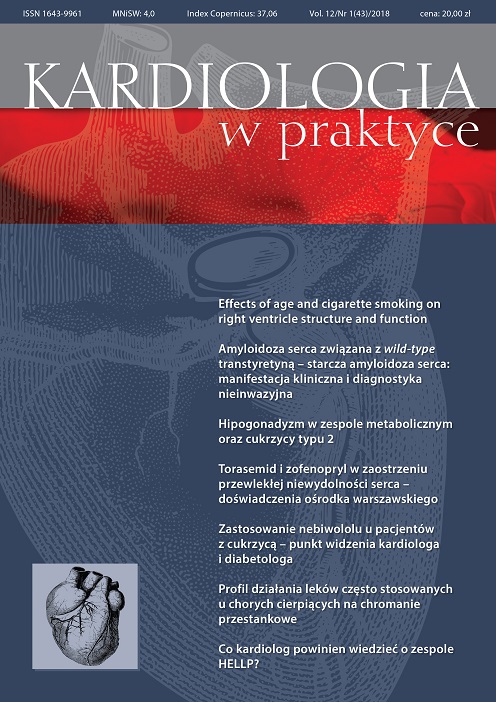Nebivolol in diabetic patients – from the perspective of a cardiologist and a diabetologist Review article
Main Article Content
Abstract
β-adrenolytics are one of the main classes of drugs used in the treatment of arterial hypertension. Older agents from
the class are associated with a risk of metabolic complications and development of diabetes. Metabolic effects of
antihypertensive drugs are of significance, as over 70% of hypertension patients suffer from concomitant metabolic
disorders and obesity. The abnormal cycle of haemodynamic and metabolic disorders leads to the development of
insulin resistance in those patients, which in turn intensifies the primary disorders. Vasodilators constitute an important
alternative for the older β-adrenolytics. Thanks to an increase in nitrogen release and vascular dilation, those
drugs exert a positive impact on the metabolic disorders involved. It has been demonstrated that vasodilation during
the use of new-generation β-adrenolytics is conducive to a reduction in the lipid disorders, blood glucose, glycated
haemoglobin, and insulin resistance. As a consequence, the risk of developing diabetes goes down. Vasodilatory
β-adrenolytics are recommended in patients suffering from hypertension by the Polish Society of Hypertension.
Downloads
Article Details

This work is licensed under a Creative Commons Attribution-NonCommercial 4.0 International License.
Copyright: © Medical Education sp. z o.o. This is an Open Access article distributed under the terms of the Attribution-NonCommercial 4.0 International (CC BY-NC 4.0). License (https://creativecommons.org/licenses/by-nc/4.0/), allowing third parties to copy and redistribute the material in any medium or format and to remix, transform, and build upon the material, provided the original work is properly cited and states its license.
Address reprint requests to: Medical Education, Marcin Kuźma (marcin.kuzma@mededu.pl)
References
2. Rizos C.V., Elisaf M.S.: Antihypertensive drugs and glucose metabolism. World J. Cardiol. 2014; 6: 517-530.
3. Mancia G., Bombelli M., Corrao G. et al.: Metabolic syndrome in the Pressioni Arteriose Monitorate E Loro Associazioni (PAMELA) study: daily life blood pressure, cardiac damage, and prognosis. Hypertension 2007; 49: 40-47.
4. Schmidt A.C., Graf C., Brixius K., Scholze J.: Blood pressure lowering effect of nebivolol in hypertensive patients with type 2 diabetes mellitus: the YESTONO study. Clin. Drug Investig. 2007; 27: 841-849.
5. Lacourcière Y., Poirier L., Lefebvre J. et al.: Comparative effects of a new cardioselective beta-blocker nebivolol and nifedipine sustained-release on 24-hour ambulatory blood pressure and plasma lipoproteins. J. Clin. Pharmacol. 1992; 32: 660-666.
6. Flather M.D., Shibata M.C., Coats A.J. et al.: Randomized trial to determine the effect of nebivolol on mortality and cardiovascular hospital admission in elderly patients with heart failure (SENIORS). Eur. Heart J. 2005; 26(3): 215-225.
7. Brixius K., Middeke M., Lichtenthal A. et al.: Nitric oxide, erectile dysfunction and beta-blocker treatment (MR NOED study): benefit of nebivolol versus metoprolol in hypertensive men. Clin. Exp. Pharmacol. Physiol. 2007; 34(4): 327-331.
8. International Diabetes Federation, Diabetes Atlas – 8TH. [online: diabetesatlas.org].
9. Sieradzki J., Grzeszczak W., Karnafel W. et al.: Badanie PolDiab. Część I. Analiza leczenia cukrzycy w Polsce. Diabetologia Praktyczna 2006; 7(1): 8-15.
10. Zalecenia kliniczne dotyczące postępowania u chorych na cukrzycę 2017. Stanowisko Polskiego Towarzystwa Diabetologicznego. Diabet. Klin. 2017; 3(supl. A): A25-A27.
11. Sowers J.R., Epstein M., Frohlich E.D.: Diabetes, hypertension, and cardiovascular disease: an update. Hypertension 2001; 37: 1053-1059.
12. Wong N.D., Lopez V.A., L’Italien G. et al.: Inadequate control of hypertension in US adults with cardiovascular disease comorbidities in 2003-2004. Arch. Intern. Med. 2007; 167: 2431-2436.
13. UK Prospective Diabetes Study Group. Tight blood pressure control and risk of mactrovascular and microvascular complications in type 2 diabetes: UKPDS 38. Br. Med. J. 1998; 317: 703-713.
14. 2013 ESH/ESC Guidelines for themanagement of arterial hypertension The Task Force for the management of arterial hypertension of the European Society of Hypertension (ESH) and of the European Society of Cardiology (ESC). European Heart Journal 2013; 34: 2159-2219.
15. Zasady postępowania w nadciśnieniu tętniczym – 2015. Wytyczne Polskiego Towarzystwa Nadciśnienia Tętniczego. Nadciśnienie Tętnicze w Praktyce 2015; 1: 1-70.
16. Nuttall S.L., Routledge H.C., Kendall M.J.: A comparison of the beta 1-selectivity of three beta 1-selective beta-blokers. J. Clin. Pharm. Ther. 2003; 28(3): 179-186.
17. Celik T., Iysoy A., Kursakliglu H. et al.: Comparative effects of nebivolol and metoprolol on oxidative stress, insulin resistance, plasma adiponectin and soluble P-selectin levels in hypertensive patients. J. Hypertens. 2006; 24: 591-596.
18. Peter P., Martin U., Shrama A., Dunne F.: Effect of treatment with nebivolol on parameters of oxidative stress in type 2 diabetics with mild to moderate hypertension. J. Clin. Pharm. Ther. 2006; 31: 153-159.
19. Marazzi G., Volterrani M., Caminiti G. et al.: Effectiveness of nebivolol and hydrochlorotiazide association on blood pressure, glucose and lipid metabolism in hypertensive patients. Adv. Ther. 2010; 27: 655-664.
20. Schmidt A.C., Graf C., Brixius K., Scholze J.: Blood pressure-lowering effect of nebiwolol in hypertensive patients with type 2 diabetes mellitus; the YESTONO study. Clin. Drug. Investig. 2007; 27: 841-849.
21. Marketou M., Gupta Y, Jain S., Vardas P.: Differential Metabolic Effects of Beta-Blockers: an Updated Systematic Review of Nebivolol. Curr. Hypertens. Rep. 2017; 19(3): 22. DOI: 10.1007/s11906-017-0716-3.
22. Rojek A., Gąsecki D., Szyndler A et al.: Sztywność naczyń tętniczych jako czynnik udaruniedokrwiennego mózgu. Nadciśnienie Tętnicze 2010; 14(6); 474-479.
23. Mahmud A., Feely J.: Beta-blokers reduce aortic stiffnessin hypertension but nebivolol, not atenolol, reduced wave reflection. Am. J. Hypertens. 2008; 21(6): 663-667.
24. Nurmamedova G.S., Gumbatov N.B., Mustafaev I.: Level of hormones of pituitary-gonadal axis, penile blood flow and sexual function in men with arterial hypertension during monotherapy with bisoprolol and nebivolol. Kardiologia 2007; 47(6): 50-53.
25. Brixius K., Middeke M., Lichtental A. et al.: Nitric oxide, erectile dysfunction and beta-blocker treatment (MR NOED study): benefit of nebivolol versus metoprolol in hypertensive men. Clin. Exp. Pharmacol. Physiol. 2007; 34(4): 327-331.

